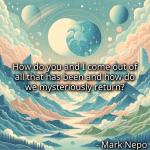 If we naturalists ever want to escape from irrationality and superstition, especially as they appear in society and politics, then we need to build positive naturalistic cultures. We need people who can help serve as pathfinders or cultural leaders. Cultural leaders are never perfect – and we can benefit by studying their flaws. At least because of the immense popularity of his writings, it’s fair to say Richard Dawkins is a cultural leader. He has his flaws and imperfections. And the extreme clarity of his writing often makes his flaws extremely clear too.
If we naturalists ever want to escape from irrationality and superstition, especially as they appear in society and politics, then we need to build positive naturalistic cultures. We need people who can help serve as pathfinders or cultural leaders. Cultural leaders are never perfect – and we can benefit by studying their flaws. At least because of the immense popularity of his writings, it’s fair to say Richard Dawkins is a cultural leader. He has his flaws and imperfections. And the extreme clarity of his writing often makes his flaws extremely clear too.
So let me say a bit about how Dawkins can help spiritual naturalists develop positive cultures. I talk about these ideas in more detail in my new book Believing in Dawkins: The New Spiritual Atheism. Of course, for anyone devoted to reason, believing also means criticizing. Science grows through self-criticism and error correction. So I’m often highly critical of Dawkins too. Dawkins is neither prophet nor messiah, and we learn as much from his failures as from his successes.
Dawkins often celebrates spirituality. He declares himself to be a highly spiritual person and he thinks science is a spiritual enterprise. He affirms naturalistic versions of the sacred and the holy. The marriage of atheism and spirituality turns out to be a happy one. Most people are shocked to hear that Dawkins affirms a kind of Einsteinian religion, or that he has a profound faith in the rationality of existence. When he talks about mystical experiences with the scientist Alan Lightman, Dawkins says “you can’t out-transcendence me”. So Dawkins has a spiritual side.
Dawkins tried Buddhist meditation but didn’t have much luck with it. Nevertheless, he endorses those atheists, like Sam Harris and Susan Blackmore, who advocate Westernized Buddhism. Harris and Blackmore celebrate the benefits provided by Buddhist breath meditation. Meditation improves your health (it lowers your blood pressure). It improves your mental health (it can help with depression and anxiety). And it has existential benefits: it enhances your well-being and makes you a better person. Here “spirituality” has nothing to do with supernatural spirits and everything to do with ethical self-transformation.
Harris and Blackmore often move from the mechanics of meditation into a system of doctrines about consciousness and about the relative values of various states of consciousness. These doctrines are consistent with science. However, they are not scientific. They are philosophical doctrines that go beyond science. Buddhism (even in its secular forms) describes ideal states of consciousness. Enlightenment is an ethical ideal. Buddhism defines an ideal way of living. This ideality surpasses actuality. It is a kind of transcendence that is consistent with science.
Dawkins often invokes Stoic themes in his writing. He talks about facing the troubles of life with Stoic serenity. When he writes about death, he writes about facing it with Stoic courage. When he talks about nature, he often portrays it in Stoic terms. He gets many of his ethical principles from Stoicism. And while Dawkins never develops his Stoicism in any systematic way, other New Atheists have become Stoics. The philosopher Massimo Pigliucci was a New Atheist who turned to Stoicism. He began to modernize the spiritual techniques of the ancient Stoics. These are techniques for ethical self-improvement. The New Stoicism involves daily meditations. It involves regular ascetic practices (such as fasting or other practices of voluntary self-deprivation designed to help you get mentally and morally tougher).
Stoicism is a moral philosophy. It defines ways you ought to respond to events (virtuous ways) and ways you ought not to respond (vicious ways). Stoicism defines a moral way of life. The Stoics also define a moral ideal: the Stoic sage is an ideal human. And while you might fail to be a sage, you can aspire to it. It can define your hopes. As an ideal, the Stoic sage is unreal or non-actual. There are none in our universe. And it’s not a scientific fact that the Sage is an ideal person. The ideality of the sage is defined by rational moral philosophy, not by empirical study of nature. Sages exist in ideal possible universes. Building cultures requires commitment to ideal possibilities.
Dawkins appreciates the value of holidays. He has a great love of Christmas. He even loves singing the Christian songs and the practices of caroling and gifting. He loves setting up the Christmas tree and so on. The other Four Horsemen also confess to loving Christmas. Of course, they point out that Christmas has many pagan elements, and that it has long been highly secularized in the West. But this seems duplicitous. Why sing about baby Jesus coming to save humanity if you don’t believe it? He even loves the Biblical Christmas stories. On these points, Dawkins was accused of hypocrisy. But he says he only celebrates Christmas as a kind of fiction. He’s doing larping: live-action role playing. Still, this seems dishonest. When Dawkins declares himself to be a cultural Christian, I think this is one of his failures.
Holidays are important because they involve shared social practices, practices which often invoke powerful positive and pro-social emotions. Although Christmas can be stressful, it aims to arouse positive emotions of joy and love. It is associated with practices of family gathering and positive social bonding. We send cards to our old friends, we give gifts. One way to build a naturalistic culture is to build new holidays. It shouldn’t be too hard to transition from Christmas to the Winter Solstice – and then to the celebration of the other holidays on the Wheel of the Year. The problem is that Christmas involves ideals which transcend the merely astronomical facts of the solstice. But ideals point beyond the actual universe. To have successful holiday traditions, naturalists need ideals. The position of the sun and earth on the solstice need to be used to symbolize ideal values and meanings. Poetically speaking, the winter solstice symbolizes the rebirth of the sun. So it is a holiday of rebirth and life after death.
Dawkins usually denies life after death. Most atheists and naturalists do the same. And, when they deny it, they’re being illogical. Dawkins recognizes that the information in genes has a kind of immortality: although organisms die, the information in their genes survives by copying into their offspring. In principle, genetic information can persist eternally. Life after death is just about copying information from some old body into some new body. Or from some old biological hardware to some new hardware of some new kind. Writers like Hans Moravec and Ray Kurzweil have recognized that life after death is a topic in theoretical computer science. Dawkins knows that your entire genome could be copied into a clone. He recognizes that this is genetic life after death.
Of course, cloning does not preserve the information in your brain and does not rescue the information encoded in your relationships with the world and other humans. Is full life after death impossible? Dawkins has a robust theory of the ways that information propagates in the evolution of biological complexity. And he often describes an evolutionary cosmology in which information accumulates. Dawkins in fact has all the principles he needs to develop a full-bodied theory of life after death. That he fails to do this testifies to a way that he was blinded by religion. Nevertheless, many entirely naturalistic theories of life after death are entirely consistent with science. And they are supported by the very same informational principles that support evolution. Naturalistic theories of life after death can support many ideals.
Dawkins contrasts astronomy with astrology. He says that astrology is both false and ugly while astronomy is both true and beautiful. But here’s the problem: astronomy has very little cultural value. Astronomers do gather to look at the stars (and planets). But astrology is a practice of making the stars and planets relevant to our lives. Astronomy deals with things as they are. Astrology deals with your hopes and fears. Of course, as a predictive tool, astrology is useless. However, as a tool for thinking about your possible futures, especially your possible future social relationships, astrology is extremely successful. Astronomy does not create culture; astrology does. Rather than just condemn astrology as ugly and false, Dawkins should have thought hard about using astronomy to develop positive naturalistic ways of social meaning-making.
Dawkins talks about how science has artistic value. Science reveals that nature is beautiful. It arouses the emotions of wonder and awe. These emotions reveal that nature is sublime. Of course, the beautiful and the sublime are aesthetic values. Dawkins says these are objective values in nature – he’s an aesthetic realist. Astronomy reveals objectively existing beauty while astrology is objectively ugly. And so Dawkins advocates science-based art. Such art exists. To celebrate the glories of evolution, the classical composer Greg Brown wrote the Missa Charles Darwin, and the heavy metal band Nightwish created the album Endless Forms Most Beautiful.
Dawkins knows that evolution generates enormous suffering. It is red in tooth and claw, a war of all against all. Nature is not utilitarian. If you’re a utilitarian, you have to say that evolution is evil. But why be a utilitarian? Nietzsche says that “existence is holy enough to justify a monstrous amount of suffering”. And, while Dawkins agrees that the sublime aspects of nature point to a kind of natural holiness, he never develops those ideas. Actual human life is saturated with evils. How can we find the holiness that makes life worth living? The Abrahamic religions turn against nature by positing their supernatural Gods. They say nature is fallen and evil. Against that anti-nature, a naturalist will want to affirm that nature is good. Here Dawkins should have turned to the work of Iris Murdoch, an atheistic philosopher who argued that atheism needs a kind of naturalized Platonism: we need the Platonic ideal of the Good.
Dawkins talks about gratitude. He thinks we experience the desire to give thanks to something for the benefits we receive in our lives. But atheists can’t give thanks to any non-existing deities. This is a problem for holidays like the American Thanks-Giving: what can atheists thank? One solution is that atheists can be grateful that they have benefits. But mere gratefulness emotionally weak. Dawkins should have thought about ways that atheists can really give thanks to natural things for natural benefits. On this point, he failed. For real gratitude, we need agents to thank. Many naturalists have argued for the existence of impersonal agents who deserve our thanks. These agents include our earthly ecosystem, the sun, the finely-tuned universe, and existence itself. Atheists can and do give thanks to the sun. Of course, you’re not going to thank these agents like you thank persons. You might thank these agents by performing rituals of reciprocation. And there are atheopagans who do these rituals. You can even think of the Burning Man festival as an immense ritual of thanks-giving.
Dawkins talks about mystical experiences. He does not deny their value and he often indicates that he has had mystical experiences. In fact, many atheists have had intense mystical experiences. Mystical experiences are not all in your head. They are about features of nature – they point to natural ideals. They reveal the ideal unity of nature or they reveal that the ultimate structure of nature is ideal. They reveal that nature itself is holy. Atheists can (and have) gone much further here to argue that all the beings in nature are grounded by the purely logical object of being-itself. While being-itself is holy, it isn’t personal and it certainly isn’t any kind of god. An atheist can agree with Iris Murdoch that being-itself is the Good. That’s entirely consistent with science.
Dawkins talks about reason-based morality. Science doesn’t define any system of moral values. Unfortunately, far too many naturalists and atheists are moral relativists. It’s hard to know why an atheist would be a moral relativist. The major theories of morality are virtue ethics, utilitarianism, and deontology (the theory of moral duty). None of those theories involve gods. In fact, all those theories allow you to morally judge religions, which is something that atheists love to do. Dawkins himself describes the Abrahamic religions as evil. To do that, he knows he needs some higher moral standard. Dawkins correctly rejects moral relativism. He says that to learn about morality, we must turn to rational moral philosophy. He therefore affirms that morality comes from reason. And Dawkins is consistent: he affirms the rationality of nature; so if morality comes from reason, then morality comes from nature. Dawkins is an ethical naturalist.
Dawkins talks about a wide range of spiritual topics. I try to critically develop Dawkinsian spirituality in my book, Believing in Dawkins: The New Spiritual Atheism. Besides the topics mentioned here, I discuss many others.
Subscribe to The Spiritual Naturalist Society
Learn about Membership in the Spiritual Naturalist Society
__________
The Spiritual Naturalist Society works to spread awareness of spiritual naturalism as a way of life, develop its thought and practice, and help bring together like-minded practitioners in fellowship.















